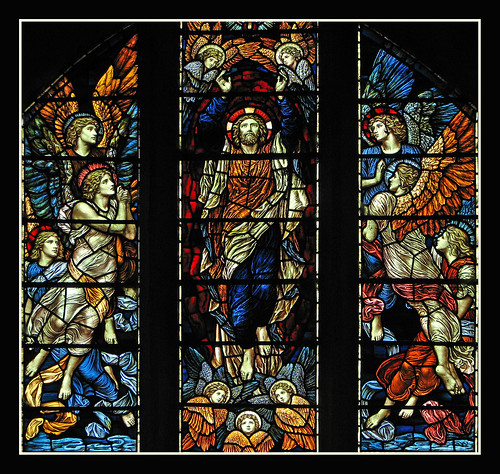Wednesday, April 30, 2008
The Lord goes up with shouts of joy
To celebrate the Ascension may seem strange. It is, after all, about an ending. Saying good-bye can be awkward, is sometimes difficult, and is often sad. His ascension means the disappearance of Jesus. Up to then he was visibly present with his disciples and now he is, it seems, to be absent. Why be joyful about this? Why think of it as something to celebrate?
At the mid-point of his gospel Luke writes: 'when the days drew near for him to be taken up, Jesus set his face to go to Jerusalem' (Luke 9:51). His ‘being taken up’ refers to his crucifixion, the moment in which he was ‘lifted up from the earth to draw all people to himself’ (John 12:32). It can also be taken to refer to his resurrection from the dead. And it is complete in his exaltation to the right hand of the Father. He has been taken up to the place of glory that is eternally his.
In the Temple at Jerusalem the High Priest went up into the Holy of Holies once a year, on the Day of Atonement, carrying the blood of sacrificed animals. Through him Israel asked forgiveness of the Lord and a renewal of the covenant. The only other person allowed to enter the Holy of Holies was a new King, on the day he was enthroned. The psalms and other texts of scripture speak about the king going up to a place of honour in the presence of the Lord, the God of Israel.
This is important background for understanding the Ascension of Jesus. He is our high priest who enters the Holy of Holies, not the earthly one in Jerusalem, but the great and perfect one in heaven. The blood he carries is not that of animals but his own blood, which is offered once and for all to gain ‘an eternal redemption’ (Hebrews 9:12). Seated at the right hand of the Father, enthroned as judge of all, Jesus is our king and our high priest.
Ascension Day is, then, the original feast of Christ the King. Because of his love and obedience the Father has exalted him and given him the name above all other names (Philippians 2:9). We celebrate his victory, and its meaning for us, the fact that he is become ‘the source of eternal salvation for all who obey him’ (Hebrews 5:9). As the prayers of today’s Mass put it, he has been ‘taken up to heaven to claim for us a share in his divine life’ and ‘where he has gone, we hope to follow’.
Although Jesus ‘withdrew from them and was carried up to heaven’ the disciples returned to Jerusalem ‘with great joy, and were continually in the temple blessing God’ (Luke 24:53). They understood, it seems, the meaning of his exaltation. They await the gift of the Spirit, the power from on high that Jesus will send. Jesus had said to his disciples, ‘if I do not go away he (the Advocate, the Holy Spirit) cannot come to you’ (John 16:7). Exalted to the right hand of the Father he sends the Holy Spirit as he had promised. This is why we rejoice at his departure, because his return to the Father establishes a new bond between heaven and earth. In sending the Spirit, Jesus fulfils his promise to remain with us always. We become his physical presence in the world, his body alive with his love. If he is with us in the Spirit, where can we be except with him in the same Spirit?
Our lives have been configured to this great paschal mystery of Jesus, to his death, resurrection, exaltation, and sending of the Spirit. Through baptism we enter sacramentally into the tomb with Jesus so that we may also rise with him as members of his body. Through confirmation we enter sacramentally into his promotion to the right hand of the Father to become temples of his Spirit and witnesses of his grace to the ends of the earth.

No comments:
Post a Comment